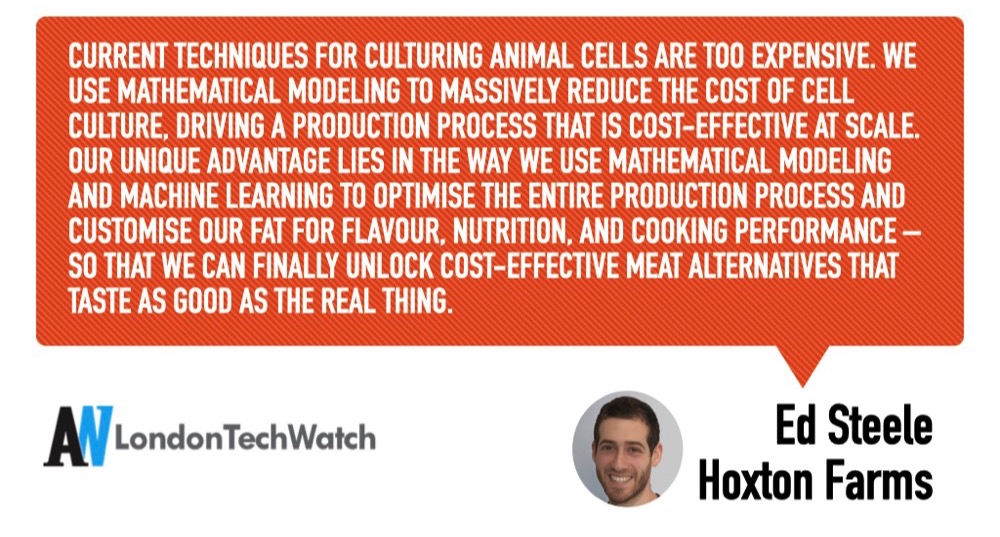Meat analogues are meat-like substances usually made from plants. These substitutes are growing in popularity thanks to brands like Impossible Burger and Beyond Meat. However, for meat enthusiasts, these substitutes often lack the feel, look, and taste of the real thing. Hoxton Farms is looking to produce real animal fat without harming animals for use in meat alternatives by extracting fat cells. Using cultivated fats has the potential to relieve pressure on the environment caused by factory farms including helping with antibiotic resistance and climate change. The company uses machine learning and mathematical modeling to build its cultured fats with plans to build a scalable prototype within the next 18 months.
London TechWatch caught up with Cofounder Ed Steele to learn more about the work to make meat alternatives viable at scale, the company’s future plans, and recent round of funding.
Who were your investors and how much did you raise?
We have raised a £2.7M seed round led by Founders Fund, with participation from BACKED VC, Presight Capital, CPT Capital, Sustainable Food Ventures, and others.
 Tell us about your product or service.
Tell us about your product or service.
At Hoxton Farms we grow real animal fat – without the animals. Starting from just a few cells, we grow purified animal fat in bioreactors to produce cultivated fat, a cruelty-free and sustainable ingredient that will finally unlock meat alternatives that look, cook, and taste like the real thing.
What inspired the start of Hoxton Farms?
The traditional meat industry is unsafe and unsustainable. Demand for meat alternatives is soaring, but they still aren’t good enough. They don’t taste right and they aren’t healthy. They are missing the key ingredient: fat.
The first generation of cell ag companies were focused on growing muscle instead of fat. Although muscle adds bulk, fat is the most important sensory component in meat and adds most of the flavour. We envision a world where all the meat that we eat is a blend of plant-based protein and cultivated fat.
Finally, the pandemic has made the need for an alternative to plant oils more urgent than ever before. Traditional meat supply chains have been disrupted by the pandemic, more consumers are aware of the diseases spread by intensive agriculture, and demand for plant-based meat is soaring.
How is it different?
Current techniques for culturing animal cells are too expensive. We use mathematical modeling to massively reduce the cost of cell culture, driving a production process that is cost-effective at scale.
Our unique advantage lies in the way we use mathematical modeling and machine learning to optimise the entire production process and customise our fat for flavour, nutrition, and cooking performance – so that we can finally unlock cost-effective meat alternatives that taste as good as the real thing.
What market you are targeting and how big is it?
We will sell our cultivated fat as an ingredient to the meat alternatives industry, starting with plant-based meat. From there, we will expand into other industries still using animal fat.
Demand for plant-based meat has grown 125 percent in the last two years, and according to Fortune Business Insights, the global meat substitute market is expected to be worth $8.15Bn by 2026.
What’s your business model?
We’re a b2b company and will sell our product directly to the businesses who need cultivated fat for their produce.
How has COVID-19 impacted your business?
Rather than impacting our business, the pandemic played a part in us coming together as cofounders to fix a large-scale problem. As previously mentioned, the crisis highlighted the issues in the traditional meat supply chain, and there is a growing demand for alternatives.
What was the funding process like?
Fundraising in the middle of a global pandemic was an interesting process. It took a bit of time for us and investors to get used to pitches over video calls. However, it gave us an opportunity to speak to many different investors all over the world.
What are the biggest challenges that you faced while raising capital?
Not meeting investors in person was a challenge, and meant that we had to work hard to ensure that we told a great story.
What factors about your business led your investors to write the check?
There are two main factors that set us apart. Firstly, we have a laser focus on fat. Fat is the most important sensory component of meat and is the hero ingredient that is missing from plant-based products. Secondly, our mathematical and computational approach to simulating and optimising cell culture really resonated with investors. It’s our philosophy that building an interdisciplinary team of Biologists, Mathematicians, and Software Engineers, all speaking the same technical language, is the way to reduce the cost and finally deliver on the promise of cellular agriculture.
Firstly, we have a laser focus on fat. Fat is the most important sensory component of meat and is the hero ingredient that is missing from plant-based products. Secondly, our mathematical and computational approach to simulating and optimising cell culture really resonated with investors. It’s our philosophy that building an interdisciplinary team of Biologists, Mathematicians, and Software Engineers, all speaking the same technical language, is the way to reduce the cost and finally deliver on the promise of cellular agriculture.
What are the milestones you plan to achieve in the next six months?
Our focus, for now, is on hiring a talented team for our research and development. We’re establishing our lab in Shoreditch and hiring for roles that include Scientist, Senior Scientist, Computational Biologist, Senior Computational Biologist, and Bioprocess Engineer.
What advice can you offer companies in London that do not have a fresh injection of capital in the bank?
Be confident and ambitious. We need a huge amount of positivity and optimism to change fundamental systems.
Where do you see the company going now over the near term?
We will be working towards a scalable prototype of our cultivated fat over the next year to eighteen months. At that point, we will start building out our pilot plant and working with commercial partners to get ready for launch.
What is your favourite restaurant in London?
Perilla in Newington Green.





